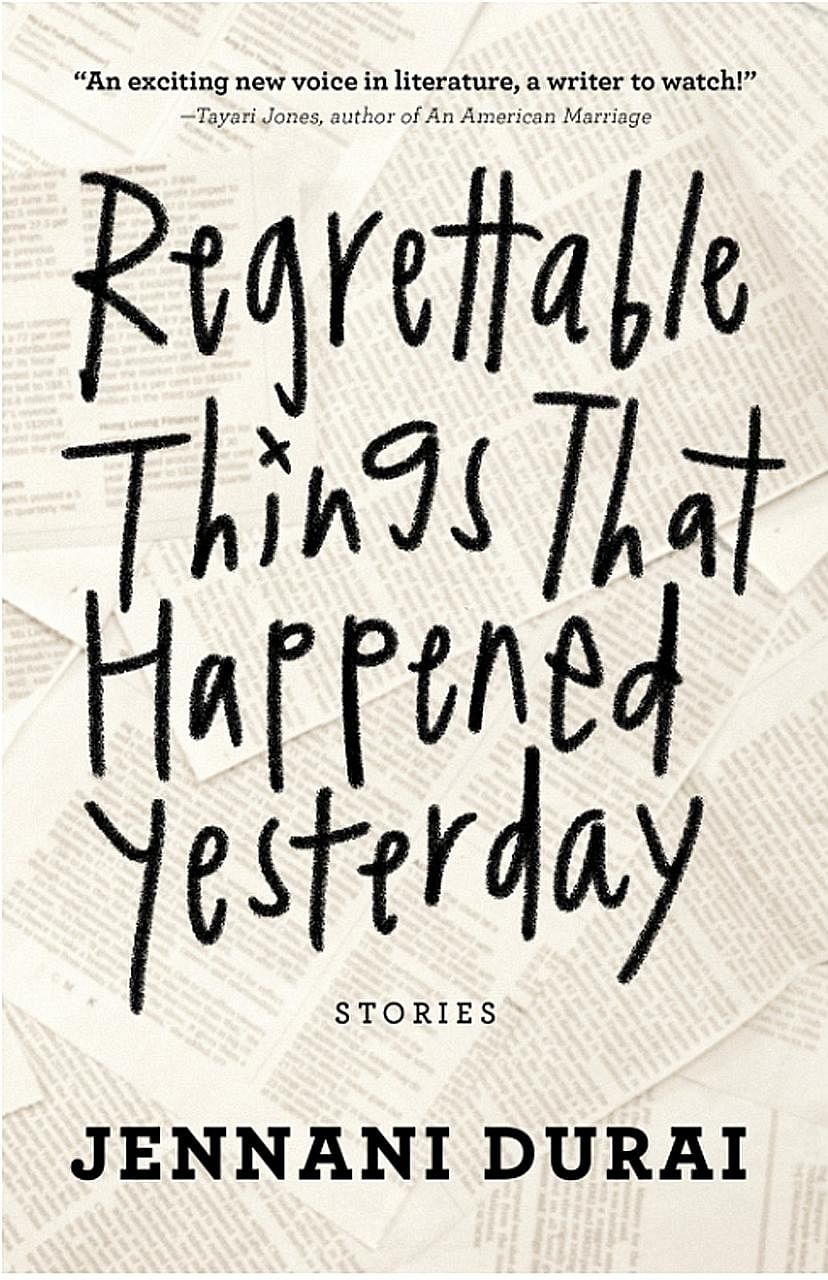FICTION
REGRETTABLE THINGS THAT HAPPENED YESTERDAY: STORIES
By Jennani Durai Epigram Books/Paperback/ 169 pages/$20.22/Major bookstores and shop.epigrambooks.sg/ 4/5 stars
Former journalist Jennani Durai's entertaining debut collection of short fiction is, not surprisingly, described as "connected by the motif of newspapers".
But while the stories are indeed loosely chained together by the appearance of obituaries, job advertisements, crime reports and film listings, Durai has a lot more than the forms and reach of mass media in mind.
Her stories' strengths often lie in her subtle examination of race and the internalised stereotypes people contend with in multicultural societies.
At times, in her portrayal of Tamil families and individuals - migrants in Singapore, Malaysia or foreigners abroad - the author uncovers the fault lines in people's understanding of one another's and their own cultures.

In the opening story, Funeral Gifts, centred on the secret life of a just-deceased grandfather, a distraught grandmother has to contend with Indian gangsters appearing at her doorstep.
"Don't be an idiot," she tells her grandson, in indignant denial. "Only Chinese people have gangs."
The Employees' Guide To Transporting Customers To Mexico, about a bunch of ethnically ambiguous-looking wait staff passing as Mexicans in a restaurant named Guacamolay! ("Never leave out the exclamation mark in the restaurant's name," warns the titular handbook), satirises the way in which minorities are often lumped together for the convenience and whims of dominant groups.
The black humour in this skewering is further employed to point out the contradictions and complicity in such situations and the inescapability of systemic discrimination: The staff go along with the ruse, culminating in a snort-worthy yet disturbing final scene of cultural appropriation and masquerade.
Elsewhere, the complexities of dating within one's ethnic group are explored succinctly and ironically in Inexplicably, while sibling rivalry in a male-centric household takes on a literary bent in Yours Truly, Vimala.
Female friendship and its booby traps drive PG-13, a tale with as much teenage drama as Mean Girls or Clueless.
Durai writes about the pitfalls of being young and having a social life with a touch of wide-eyed insouciance, but her sensitivity and thoughtfulness go some way in rescuing the subject matter from juvenilia.
At times, the shorter stories seem to turn merely upon a single conceit, leading one to wonder if deeper truths might have been excavated if they had been pushed further or sustained.
Of the 10 stories here, Never Have I Ever and Revelation To Amala Rose - the former about an undergraduate hopeful about her romantic chances with a bloke, despite being allergic to his cat; and the latter about a religious young girl frantic that her family has ascended to heaven without her - strike one as slightly undeveloped.
It is easy to conflate literary output with biography and read the title story, which comes last in this line-up in the manner of good things being saved, as evidence of how the writer (full disclosure: and a colleague, briefly) might have hated her former occupation.
Yet, Regrettable Things That Happened Yesterday, about a crime reporter sent to probe an old friend on her mother's murder, manages to convey the thorny dilemma of the job: how to maintain objectivity and professionalism, while having to behave in ways that society conventionally condemns.
How does one carry out one's duties without losing one's capacity to feel for others and, by extension, oneself? And when are those duties not worth carrying out?
Durai's clean, news editing-honed writing style is easy and enjoyable to read and her fiction reveals that she is not done asking hard questions yet.
If you like this, read: Speedboat by Renata Adler (1976, reissued 2013 by New York Review Books, paperback, $22.79, Books Kinokuniya), the cult classic which melds novel and memoir to tell the story of Jen Fein, a journalist at the fictional Standard Evening Sun.


